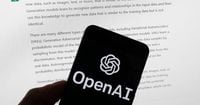In recent discussions about artificial intelligence, particularly with tools like ChatGPT from OpenAI, concerns regarding user privacy have come to the forefront. Experts have labeled ChatGPT a potential "black hole for confidentiality," raising alarms about the safety of personal information shared with the chatbot. As millions of users turn to AI for assistance in daily tasks, Forbes has highlighted five critical types of information that should never be disclosed to such public chatbots.
ChatGPT processes billions of requests daily, making it an indispensable tool for many. However, the implications of using such a powerful AI tool are significant. According to Forbes, while OpenAI does not guarantee that user data is fully protected, there are several key issues users should be aware of. The data entered into ChatGPT can be utilized for training models, reviewed by humans, and potentially accessed by other users, meaning any information shared should be considered public.
One of the most alarming aspects discussed is the sharing of illegal or unethical queries. Many AI chatbots, including ChatGPT, are equipped with filters designed to prevent misuse for illegal activities. However, users should be aware that asking about committing crimes, engaging in fraud, or manipulating individuals could lead to serious legal repercussions. As the article notes, it is crucial to understand that these systems are monitored, and attempts to use AI for illicit purposes can be reported to authorities.
Another critical area of concern is the sharing of login credentials. Experts warn that providing AI chatbots with such sensitive information can be dangerous. Once personal data enters a public chatbot, it becomes difficult, if not impossible, to control where that information goes. There have been documented cases where personal data entered by one user was inadvertently disclosed in responses to others, creating a serious breach of privacy.
Furthermore, entering financial information, such as credit card numbers or bank account details, poses significant risks. Chatbots lack the robust security measures found in banking or e-commerce platforms, making users vulnerable to fraud, phishing attacks, and other forms of financial exploitation. As noted in the Forbes article, once data is provided to an AI, its future handling is uncertain, leaving users at risk.
Confidential information is another category that should be approached with caution. Business documents, meeting notes, or sensitive materials should never be shared with ChatGPT, as doing so could violate confidentiality agreements or even compromise trade secrets. The importance of safeguarding such information cannot be overstated, especially in professional environments.
Health-related queries also pose unique challenges. Many users may feel tempted to seek medical advice from ChatGPT, but experts urge caution. The recent updates to the AI allow it to "remember" information from different chats, which raises concerns about the confidentiality of health data. No guarantees exist regarding the safety of sensitive health information, and users should be wary of discussing personal medical issues with an AI.
The implications of these privacy concerns are compounded by the sheer scale of ChatGPT's user base. OpenAI estimates that the number of ChatGPT users is in the tens of millions, with the chatbot consuming vast amounts of electricity to operate. As the demand for AI services grows, so too does the potential for misuse and data breaches.
Additionally, there are reports of cybercriminals injecting "poisoned data" into large AI training datasets. This malicious tactic can lead to significant consequences, including the spread of misinformation and the potential for AI systems to be manipulated in harmful ways. As such, users must remain vigilant about what they share with AI platforms.
In light of these warnings, it is essential for users to recognize the risks associated with sharing personal information with chatbots like ChatGPT. The allure of instant answers and assistance must be weighed against the potential dangers to privacy and security. As AI technology continues to evolve, understanding these risks will be crucial for safe and responsible usage.
In summary, while ChatGPT and similar AI tools offer unprecedented convenience and capability, users must exercise caution regarding the information they share. By being aware of the types of data that should remain private, individuals can better protect themselves in an increasingly digital world.




